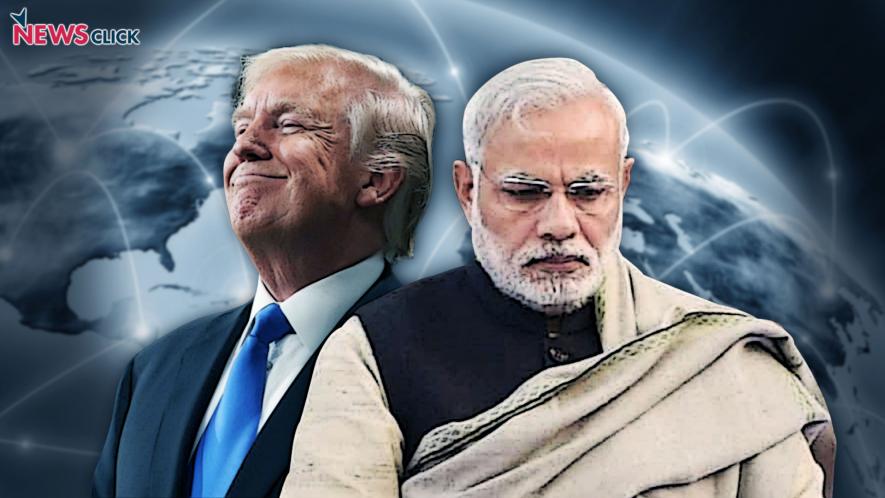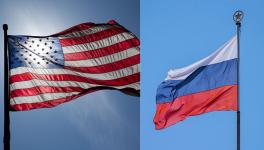Indo-US Relations: Faced With US’s Bullying, India Sues For Exemption

It took only the threat of ‘Countering America’s Adversaries Through Sanctions Act’ (CAATSA) of the United States to get India to bend. Manu Pubby wrote in the Economic Times that financial sanctions under CAATSA by the US have “hit hard” India’s arms trade with Russia – putting in limbo the payment worth $2 billion for weapons and equipment, as well as repairs of warships and aircrafts. CAATSA threatens to impose financial transactions related to military and other trade, so as to compel countries to bow down to its diktat. INS Chakra, a nuclear submarine on lease from Russia, needed repairs following an accident it suffered last year, worth $15 million. The amount is small, but the repair work is stalled because State Bank of India refused to make remittances to Moscow. Russia’s flagship arms trading company Rosoboronexport was listed with the US office of Foreign Assets Control last month and on April 17, all payments to Moscow were halted by the Indian bank SBI. India was in the midst of negotiating a closure to a deal to buy S-400 surface to air missiles defense system worth $5.5billion from Russia. Narendra Modi government insists that procuring S400 air defense missiles is vital for India’s defense planning. If this is the case—as Service Chiefs also contend—then Indian government’s and its officials’ capitulation before the US is inexplicable.
The US, in a way, has been blackmailing countries into whittling down their trade – arms trade, in particular, with Russia, imports of oil and natural gas from Iran, and has been trying to shun North Korea. This shows what the US has always been: an imperial power, which can ride roughshod over any country for profit and hegemony. Turkey, a NATO ally of the US, has been threatened with full might of CAATSA, if it goes ahead to procure S400 ADM from Russia. It has also stalled the sale of US F35 fighter jets to Turkey. So far, Turkey has warned of retaliation. But none has responded as meekly as the Indian government, which filed “requests” with the US administration to “exempt” India. Asking a bully to make an exception in your case is a mark of inferiority complex, and so is arm twisting by the US brings to bear in its relationship with those ‘inferior’ to it in terms of power, ally and foe. It did not occur to the Indian government that such arbitrary and aggressive posture of US, which affects India’s sovereign right to decide what to buy and whom to buy from – as long as there is no violation of international law and conventions, which abhors unilateral acts – demanded a firm resolve.
The Bill on CAATSA was introduced by Californian Congressperson Ed Royce, who is a “friend of India”, to sanction countries which have “substantial dealings” with Russia, Iran or North Korea. In February, Indian foreign secretary Vijay Gokhale asked the US administration for making an “exemption” for India. This exhibits Indian policymakers’ tendency to bend over backwards to ingratiate with the US officials, and to send a message that India is willing to join the US’s imperial orbit. Therefore, for two days (May 3-4, 2018) Indian and the US’s officials met to “review” what US calls “foundational pacts”: Communication Compatibility and Security Arrangement (COMCASA) and Basic Exchange and Cooperation Agreement (BECA). Air Vice Marshal of Indian Air Force Manmohan Bahadur told Ananth Shreyas of The Financial Express Online that “India may consider signing BECA and COMCASA, if these enable the defense forces to use these equipment to their full capability.” However, the decision, “must be a very conscious one, so that our rights are protected”. There is a seminal difference between protecting “rights” as against protecting a country’s “interests”. Assuming that this was a slip, the allure of “hi-tech communications and surveillance equipment” is not.
Ben Scharatz, Senior Director US India Business Council, told Business Line that signing COMCASA “creates the condition for the Indian military to receive modern, secure and net enabled weapon system such as precision armed, air to air missiles, space & navigation systems that are critical component platforms like fighter aircraft and unmanned aerial systems.” The argument is that earlier India bought expensive commercial communication equipment, thereby raising the cost of procurement, whereas COMCASA will bring these costs down. It is a truism that while buying military equipment, price alone is not the consideration sometimes. Paying more can be a way of avoiding having to compromise vital interests. In other words, getting something cheap may be, in fact, more expensive because it entails sacrificing something intangible, but most dear: independence. In this USIBC sales pitch, the hidden or the actual cost is never disclosed. Besides, loss of independence cannot be measured in monetary terms. Because proprietary technology will remain a property of the US now, backed by obligations under ‘foundational pacts’. Thus, control and command will remain for all practical purpose with the US; its military personnel maintain an intrusive presence to ensure compliance with the US’s domestic laws and rules. Besides, the future cost of equipment, wherewithal, repair and spare parts will more than make up for the first discounted order, since without repeat orders, no original equipment manufacturer (OEM) will bring any significant part of manufacturing to India.
Amidst propaganda blitz about hi-tech weapons and communications from the US raining on us and the pitfalls of forging too close a tie with the US, makes all too evident the need for persisting with an independent foreign policy and strategic autonomy. This today lies buried under the weight of the hubris and weakness of India’s rulers. Hubris throws us in the direction of right wing adventurism – always ready to sell country’s interests to their self-interest, while rulers of weak countries use weakness to justify becoming militarily powerful, a panacea somehow for much of the country’s problems. So showing off India’s military prowess in foolish ventures such as “surgical strike’, firing five bullets for every one fired by Pakistan to cause three to four times “pain”, face-offs with China, announcing fight to finish the militants in Kashmir, have proved to be inconsequential. The baleful consequence of India’s dependence on weapon imports to reach the illusionary military parity vis a vis China and Pakistan has run its course. The “56 inch” government of Narendra Modi that seeks to forge military bond with the US, a warmongering bully abroad and a vile authoritarian at home, risk compromising independence all in order to take on China and pull its weight in the region. Since there are no ‘free lunches’ in life, there is a price to be paid to the US, in the form of giving up on strategic autonomy and independent foreign policy.
Get the latest reports & analysis with people's perspective on Protests, movements & deep analytical videos, discussions of the current affairs in your Telegram app. Subscribe to NewsClick's Telegram channel & get Real-Time updates on stories, as they get published on our website.























